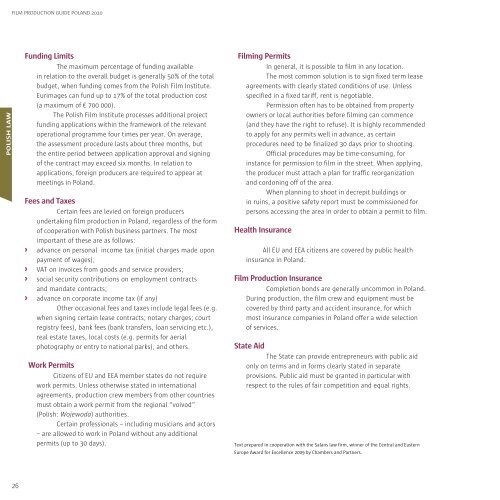Polish Cinema today - Polski Instytut Sztuki Filmowej
Polish Cinema today - Polski Instytut Sztuki Filmowej
Polish Cinema today - Polski Instytut Sztuki Filmowej
Create successful ePaper yourself
Turn your PDF publications into a flip-book with our unique Google optimized e-Paper software.
<strong>Polish</strong> law<br />
FILM PRODUCTION GUIDE POLAND 2010<br />
2<br />
Funding limits<br />
The maximum percentage of funding available<br />
in relation to the overall budget is generally 50% of the total<br />
budget, when funding comes from the <strong>Polish</strong> Film Institute.<br />
Eurimages can fund up to 17% of the total production cost<br />
(a maximum of € 700 000).<br />
The <strong>Polish</strong> Film Institute processes additional project<br />
funding applications within the framework of the relevant<br />
operational programme four times per year. On average,<br />
the assessment procedure lasts about three months, but<br />
the entire period between application approval and signing<br />
of the contract may exceed six months. In relation to<br />
applications, foreign producers are required to appear at<br />
meetings in Poland.<br />
Fees and taxes<br />
Certain fees are levied on foreign producers<br />
undertaking film production in Poland, regardless of the form<br />
of cooperation with <strong>Polish</strong> business partners. The most<br />
important of these are as follows:<br />
› advance on personal income tax (initial charges made upon<br />
payment of wages);<br />
› VAT on invoices from goods and service providers;<br />
› social security contributions on employment contracts<br />
and mandate contracts;<br />
› advance on corporate income tax (if any)<br />
Other occasional fees and taxes include legal fees (e.g.<br />
when signing certain lease contracts; notary charges; court<br />
registry fees), bank fees (bank transfers, loan servicing etc.),<br />
real estate taxes, local costs (e.g. permits for aerial<br />
photography or entry to national parks), and others.<br />
work Permits<br />
Citizens of EU and EEA member states do not require<br />
work permits. Unless otherwise stated in international<br />
agreements, production crew members from other countries<br />
must obtain a work permit from the regional “voivod”<br />
(<strong>Polish</strong>: Wojewoda) authorities.<br />
Certain professionals – including musicians and actors<br />
– are allowed to work in Poland without any additional<br />
permits (up to 30 days).<br />
Filming Permits<br />
In general, it is possible to film in any location.<br />
The most common solution is to sign fixed term lease<br />
agreements with clearly stated conditions of use. Unless<br />
specified in a fixed tariff, rent is negotiable.<br />
Permission often has to be obtained from property<br />
owners or local authorities before filming can commence<br />
(and they have the right to refuse). It is highly recommended<br />
to apply for any permits well in advance, as certain<br />
procedures need to be finalized 30 days prior to shooting.<br />
Official procedures may be time-consuming, for<br />
instance for permission to film in the street. When applying,<br />
the producer must attach a plan for traffic reorganization<br />
and cordoning off of the area.<br />
When planning to shoot in decrepit buildings or<br />
in ruins, a positive safety report must be commissioned for<br />
persons accessing the area in order to obtain a permit to film.<br />
health insurance<br />
All EU and EEA citizens are covered by public health<br />
insurance in Poland.<br />
Film Production insurance<br />
Completion bonds are generally uncommon in Poland.<br />
During production, the film crew and equipment must be<br />
covered by third party and accident insurance, for which<br />
most insurance companies in Poland offer a wide selection<br />
of services.<br />
state aid<br />
The State can provide entrepreneurs with public aid<br />
only on terms and in forms clearly stated in separate<br />
provisions. Public aid must be granted in particular with<br />
respect to the rules of fair competition and equal rights.<br />
Text prepared in cooperation with the Salans law firm, winner of the Central and Eastern<br />
Europe Award for Excellence 2009 by Chambers and Partners.


